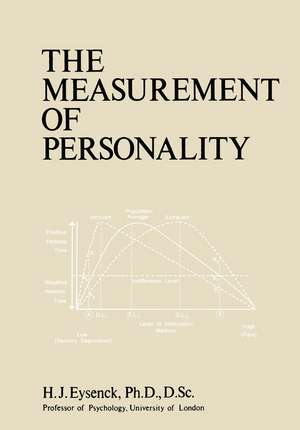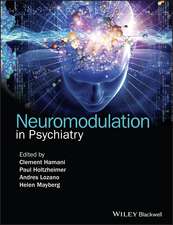The Measurement of Personality
Editat de Hans J. Eysencken Limba Engleză Paperback – 12 feb 2012
Preț: 388.68 lei
Preț vechi: 409.13 lei
-5% Nou
Puncte Express: 583
Preț estimativ în valută:
74.37€ • 77.86$ • 61.54£
74.37€ • 77.86$ • 61.54£
Carte tipărită la comandă
Livrare economică 07-21 aprilie
Preluare comenzi: 021 569.72.76
Specificații
ISBN-13: 9789401161701
ISBN-10: 9401161704
Pagini: 532
Ilustrații: 512 p.
Dimensiuni: 178 x 254 x 28 mm
Greutate: 0.91 kg
Ediția:Softcover reprint of the original 1st ed. 1976
Editura: SPRINGER NETHERLANDS
Colecția Springer
Locul publicării:Dordrecht, Netherlands
ISBN-10: 9401161704
Pagini: 532
Ilustrații: 512 p.
Dimensiuni: 178 x 254 x 28 mm
Greutate: 0.91 kg
Ediția:Softcover reprint of the original 1st ed. 1976
Editura: SPRINGER NETHERLANDS
Colecția Springer
Locul publicării:Dordrecht, Netherlands
Public țintă
ResearchCuprins
I Models of Personality.- Personality Research: Components of Variance Attributable to the Person and the Situation.- Personality in Monkeys: Factor Analyses of Rhesus Social Behaviour.- The Nature of Extraversion: A Genetical Analysis.- Primaries or Second-order Factors: A Critical Consideration of Cattell’s 16 PF Battery.- Eysenck’s Personality Dimensions: A Model for the MMP.- II The Physiological Basis of Personality.- Extraversion-Introversion and the EEG.- Electrodermal Lability as a Personality Dimension.- Initial Amplitude and Rate of Habituation of Orienting Reaction in Relation to Extraversion and Neuroticism.- Sensation Seeking and Cortical Augmenting-Reducing.- Salivary Response to Lemon Juice as a Measure of Introversion.- Introversion-Extraversion and Circadian Rhythms.- Personality and the Inverted-U Relation.- III Pain, Sensory Deprivation, and Sensation Seeking.- Introversion and Isolation Tolerance.- Personality and Time Estimation in Sensory Deprivation.- Tolerance for Experimentally Induced Pain as Related to Personality.- “Stimulus Hunger”: Individual Differences in Operant Strategy in a Button-pressing Task.- Extraversion and Preferred Level of Sensory Stimulation.- Extraversion and Variety-seeking in a Monotonous Task.- Stimulant and Depressant Drugs on Kinaesthetic Figural After-effects.- The Tolerance for Pain and for Sensory Deprivation.- IV Personality and Vigilance.- Physiological and Personality Correlates of Commission Errors in an Auditory Vigilance Task.- Varied Auditory Stimulation, Temperament Differences and Vigilance Performance.- Personality and Physiological Correlates of Performance Decrement on a Monotonous Task Requiring Sustained Attention.- Vigilance Performance Related to Extraversion-Introversion and Caffeine.- TheEffect of a Low Rate of Regular Signals upon the Reaction Times of Introverts and Extraverts.- Errors of Commission as a Function of Age and Temperament in a Type of Vigilance Task.- V Personality and Perceptual Reactions.- Extraversion and Auditory Sensitivity to High and Low Frequency.- Relation of Visual Sensitivity to Extraversion.- Effect of Intensity of Visual Stimulation on Auditory Sensitivity in Relation to Personality.- Effects of Intensity of Auditory Stimulation on Photopic Visual Sensitivity in Relation to Personality.- Extraversion and Pupillary Response to Affective and Tabboo Words.- Colour Preferences, Extraversion, and Neuroticism of Art Students.- Preference of Complexity as a Function of Neuroticism, Extraversion, and Amplitude of Orienting Response.- The Effects of Chlorpromazine and Dextroamphetamine Sulphate on the Visual Stimulation Preference of Extraverts and Introverts.- VI Psychomotor Behaviour.- Effects of Muscle Relaxation Training on State and Trait Anxiety in Extraverts and Introverts.- Psychomotor Performance as a Function of White Noise and Personality Variables.- Personality and the Success of Card-punch Operators in Training.- Evidence for the Generality of Reminiscence as a Function of Extraversion and Neuroticism.- Strategies in Rotary Pursuit Tracking.- Anxiety as a Function of Task Performance Feedback and Extraversion-Introversion.- VII Learning and Conditioning.- Emotionality and Performance on Competitional and Non-competitional Paired-associates.- Activation, Manifest Anxiety and Verbal Learning.- Extraversion, Neuroticism, and Verbal Reasoning Ability as Determinants of Paired-associates Learning.- Extraversion and Increased Interference in Paired-associate Learning.- Interference, Extraversion and Paired-associate Learning.- Effects of Anxiety Level and Extraversion-Introversion on Probability Learning.- The Influence of Personality and Task Conditions on Learning and Transfer.- The Effects of Stimulant and Depressant Drugs on Verbal Conditioning.- Conditioning, Introversion-Extraversion and the Strength of the Nervous System.- VIII Memory and Recall.- Extraversion, Arousal, and Paired-associate Recall.- Short- and Long-term Memory as a Function of Individual Differences in Arousal.- Relationship between Sharpening and Extraversion.- Individual Differences in Speed of Retrieval from Semantic Memory.- Arousal and Speed of Recall.- Individual Differences in Cognition: Some Relationships between Personality and Memory.- IX Cognition and Creativity.- Anxiety, Extraversion-Introversion, and Divergent Thinking Ability.- Divergent Thinking: A Complex Function of Interacting Dimensions of Extraversion-Introversion and Neuroticism-Stability.- The Relationships between Intelligence, Personality and Creativity under Two Conditions of Stress.- Individual Differences in Solution Time in Error-free Problem Solving.- Personality in Primary School Children: 1. Ability and Achievement.- The Effects of Chronological Age on the Relationship of Intelligence and Academic Achievement with Extraversion and Neuroticism.- Introversion-Extraversion, Time Stress, and Caffeine: Effect on Verbal Performance.- X Social Behaviour.- Personality Characteristics of Good Judges of Others.- Personality and Speech.- Personality and Differential Susceptibility to Hypnosis: Further Replication and Sex Differences.- Personality and Sexual Adjustment.- Extraversion, Neuroticism, Psychoticism and Antisocial Behaviour in Schoolgirls.













